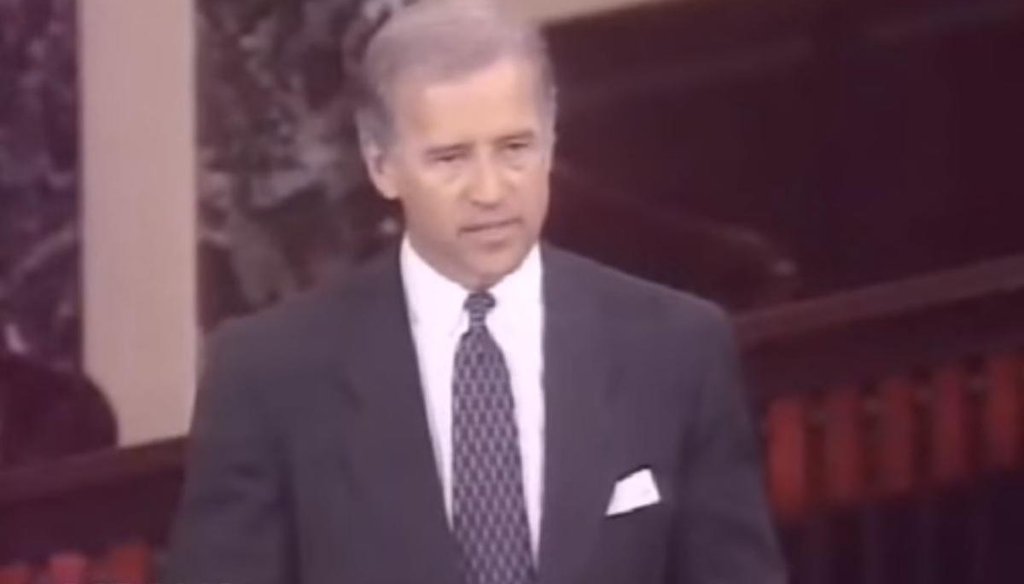Stand up for the facts!
Our only agenda is to publish the truth so you can be an informed participant in democracy.
We need your help.
I would like to contribute

Republicans in the Senate are using a 1992 floor speech by then-Sen. Joe Biden to justify not confirming President Barack Obama's Supreme Court justice nominee, Merrick Garland. (CSPAN)
Senate Majority Leader Mitch McConnell invoked the so-called "Biden Rule" to justify why the Senate should not consider the nomination of Merrick Garland to the U.S. Supreme Court in an election year.
Yes, as in Vice President Joe Biden.
McConnell is using Biden’s own words from 1992, when George H.W. Bush was president and Biden was chairman of the Senate Judiciary Committee, to explain why he intends to block President Barack Obama’s Supreme Court pick in an election year.
"The Senate will continue to observe the Biden Rule so that the American people have a voice in this momentous decision" on who to name to the court, McConnell said in a March 16 speech on the floor of the Senate.
McConnell went on to quote some words from then-Judiciary Chairman Biden to show why the Senate’s disagreement with Obama is "about a principle, not a person."
Help PolitiFact fact-check the immigration debate in 2016
Did Biden really say he would be against the president nominating a Supreme Court justice in an election year when political control of the Senate and White House were flipped?
We wanted to use our In Context feature to lay out what Biden said back then outside of McConnell’s sound bite. Readers can determine if it’s relevant now.
Biden's floor speech was on June 25, 1992, more than three months later in the election cycle than it is now.
There was no Supreme Court vacancy to fill.
There was no nominee to consider.
The Senate never took a vote to adopt a rule to delay consideration of a nominee until after the election.
Nonetheless, Biden took to the floor in a speech addressing the Senate president to urge delay if a vacancy did appear. But he didn't argue for a delay until the next president began his term, as McConnell is doing. He said the nomination process should be put off until after the election, which was on Nov. 3, 1992.
Many of Biden's words echo the state of Washington today:
"Given the unusual rancor that prevailed in the (Clarence) Thomas nomination, the need for some serious reevaluation of the nomination and confirmation process, and the overall level of bitterness that sadly infects our political system and this presidential campaign already, it is my view that the prospects for anything but conflagration with respect to a Supreme Court nomination this year are remote at best."
He noted that among the previous seven nominations, two were not confirmed and two passed with strong opposition.
"In my view, politics has played far too large a role in the Reagan-Bush nominations to date. One can only imagine that role becoming overarching if a choice were made this year, assuming a justice announced tomorrow that he or she was stepping down.
"Should a justice resign this summer and the president move to name a successor, actions that will occur just days before the Democratic Presidential Convention and weeks before the Republican Convention meets, a process that is already in doubt in the minds of many will become distrusted by all. Senate consideration of a nominee under these circumstances is not fair to the president, to the nominee, or to the Senate itself.
"Mr. President, where the nation should be treated to a consideration of constitutional philosophy, all it will get in such circumstances is a partisan bickering and political posturing from both parties and from both ends of Pennsylvania Avenue. As a result, it is my view that if a Supreme Court Justice resigns tomorrow, or within the next several weeks, or resigns at the end of the summer, President Bush should consider following the practice of a majority of his predecessors and not — and not — name a nominee until after the November election is completed."
Biden said if Bush were to nominate someone anyway, "the Senate Judiciary Committee should seriously consider not scheduling confirmation hearings on the nomination until after the political campaign season is over."
Based on Biden's words, it appears he would not have objected to Bush nominating someone the day after election day. It would have given the Senate more than two and a half months to vote on confirmation.
Biden contended this was not an attempt to play politics with the selection.
"Some will criticize such a decision and say it was nothing more than an attempt to save a seat on the court in the hopes that a Democrat will be permitted to fill it. But that would not be our intention, Mr. President, if that were the course we were to choose in the Senate — to not consider holding hearings until after the election. Instead, it would be our pragmatic conclusion that once the political season is under way, and it is, action on a Supreme Court nomination must be put off until after the election campaign is over."
In the case of Obama's nomination of Garland, Democrats have argued that the Supreme Court seat should be filled immediately because the court needs a deciding vote.
Biden in his 1992 speech addressed that issue, saying that some people "may fret that this approach would leave the Court with only eight members for some time. But as I see it, Mr. President, the cost of such a result, the need to reargue three or four cases that will divide the justices four to four are quite minor compared to the cost that a nominee, the president, the senate, and the nation would have to pay for what would assuredly be a bitter fight, no matter how good a person is nominated by the President, if that nomination were to take place in the next several weeks."
Our Sources
Mitch McConnell senate website, "McConnell On Supreme Court Nomination," March 16 2016, accessed March 17, 2016
YouTube, "McConnell responds to Supreme Court nomination," PBS NewsHour channel, March 16, 2016 and "1992: Sen. Biden says President Bush should not name nominee until after election (C-SPAN)," C-SPAN channel, Feb. 22, 2016 and "Biden From ’92: President Should 'Not Name A Nominee Until After The November Election,'" GOP War Room channel, Feb. 22, 2016, all accessed March 17, 2016






























